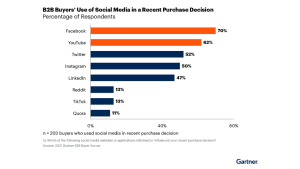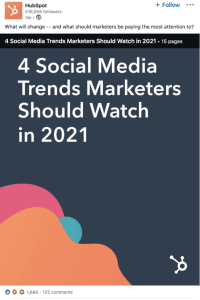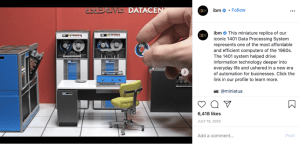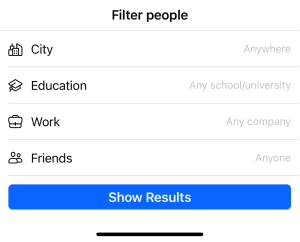While B2C businesses thrived on social platforms from the inception of social media platforms, it wasn’t really the case for B2B brands. But in 2024, B2B brands are all in for social media and leveraging it to their advantage for audience engagement, establishing authority, and building thought leadership.
Even though there are a number of options available, most B2B businesses get confused when it comes to choosing a social media platform that would be ideal for their business. In this blog, we will help you figure out what the ideal social media networks are for your B2B business.

1. LinkedIn
With a member count of over 830 million, LinkedIn happens to be one of the best social media networks for B2B businesses around the world. From organic lead generation to expanding your professional network – LinkedIn offers a range of features exclusively designed for professionals. In fact, 96% of B2B content marketers named LinkedIn one of the most effective social media platforms. Especially if your role revolves around appointment management, sales, and partnerships, then LinkedIn can be a great place to start connecting with C-level executives.
The best part about it is that you can target and search your audience based on their job descriptions, job roles, company sizes, company names, and more. Even if you are looking to create content for your audience, you have options on LinkedIn to experiment with content formats like videos, live sessions, carousels, text posts, and more.

For example, HubSpot is quite serious about its LinkedIn game and ensures audience engagement by providing a consistent source of information and knowledge by sharing articles, guides, business insights, and more.
2. X (Twitter)
With over 465 million users dominating the platform, it’s an excellent opportunity for B2B marketers to connect with their prospects in real-time. If you are a marketer who prefers real-time audience engagement using conversation threads or retweets or want to offer practical insights for your ideal audience – X (Twitter) can be used to your advantage.
Where X (Twitter) stands out is when it comes to specific targeting, such as audience lookalikes, behavior-based targeting, interest targeting, and more, which helps you understand your audience and strategize better.
Even if your goal is just to establish brand awareness and build a reputation online, Twitter can support your efforts just as any online reputation management platform would do.
3. Instagram
Gone are the days when Instagram was just a photo-sharing hub. Fast forward to today, Instagram boasts over 1 billion active users for individuals from multiple industries. While B2C companies contributed to the platform majorly, B2B individuals have also started taking it seriously.
With the audience’s attention span shortening day by day (especially the Gen Zs), Instagram Reels can be easily leveraged to target your ideal audience – the secret to it lies in capturing the viewers’ attention before they scroll through.
For example, IBM uses its Instagram profile to share photos and videos dated from the past to establish its brand authority in the industry. They prioritize engagement on this platform both for their employees as well as for their audience, where they share their employee experience, explain complex concepts, and more.

You can use Instagram in your B2B business’s strategy by:
- collaborating with influencers of all levels who can promote your products and services to their audience
- using call to action in your Instagram posts can encourage organic user engagement for your business
- incorporating hashtags and geotags in your post’s captions to reach a wider group of audience
- promoting your content using Instagram ads to boost engagement and increase your profile’s reach
- joining different communities and groups to get the latest updates and insights about your network
4. Facebook
Even though it’s not a B2B platform primarily, there are certain features of Facebook that have made B2B businesses consider it for the good. With over 2.9 billion monthly users actively using the platform, the scopes of brand discovery and real-time engagement are highest here. It’s the ideal platform if you want to build a relationship with your audience, understand their pain points, and observe their behavior patterns in depth.
There are even search features that allow you to narrow down your search patterns based on location, work, friends, and education.

Facebook offers an incredible opportunity for establishing brand awareness as well, where you can share about your company’s policies or media snippets from a special celebration at the office, which can boost your page’s organic reach. If that seems like a lot to manage, you can use Facebook automation tools to manage and streamline activities on Facebook by automating it.
5. YouTube
YouTube is no longer just for entertainment – with over 2 billion users, even B2B brands consider it a crucial part of their strategy. As video content is constantly on the rise, it happens to be an ideal platform for B2B businesses globally, especially service-based ones, as they can get ample scope to explain their service and educate their ideal customers.
The best part is – you can target audiences based on their locations, behavior of your target audience, and age groups, which makes audience nurturing a cakewalk for your business. However, the quality and content of the video are always a priority and make the ultimate impact, no matter how specific your targeting is.
So, while focusing on your YouTube strategy, ensure that:
- you are providing the right and authentic information to your audience through original videos
- you have optimized your YouTube channel and videos with relevant information and keywords
- you are using relevant and compelling video thumbnails that are instilling curiosity in your audience
- you are using an appropriate call to action for all your videos
- you are measuring your YouTube analytics and making the necessary improvements
Takeaway
The impact of social media networks on B2B businesses is definitely multifaceted as it plays a dynamic role in almost every domain – from brand awareness to lead generation and even lead conversions. The amount of active users and soaring engagement on these platforms is a clear indication of the endless possibilities they offer your brand to stand out in the ever-competitive digital space. So, what are you waiting for? Go ahead, choose the social platform that aligns with your business, and start building relationships with your customers.

